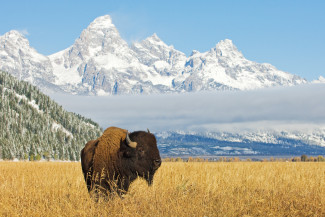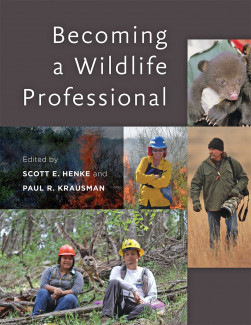
Johns Hopkins UniversityEst. 1876
America’s First Research University
Now Browsing:
Becoming a Wildlife Professional

The origin of Becoming a Wildlife Professional was conceived after 20 years of experience teaching introductory wildlife ecology to freshmen university students. During the first class of each new semester, students are asked what wildlife career they desire. There are literally hundreds of potential careers a person can obtain with a BS degree in wildlife ecology and management. Nonetheless, students typically reply with only two answers – a game warden or a manager of a wildlife game ranch. Incoming university students are unaware of the variety of career options available to them within the wildlife field. Furthermore, graduate students in wildlife programs are often not aware of the variety of jobs available to them in the wildlife profession. For example, last semester at the University of Montana, we had a special graduate seminar that introduced graduate students to the numerous types of jobs available. Quite simply, there are many students that are not well informed about the opportunities available to them. Unfortunately, high school career counselors seem to be equally unaware of potential wildlife-related careers and often provide limited advice to interested students. For example, we have asked several high school counselors what career they would suggest to a student interested in a wildlife degree and have received two common responses – a veterinarian and a park ranger. Such advice is naïve at best. A person cannot become a veterinarian with a wildlife degree only. Although a person can become a park ranger with a BS degree in wildlife ecology, the job entails much more than keeping bears from stealing picnic baskets.

Although our experience is limited to the regions where we have worked (i.e., Texas, Arizona, Montana, Alabama) similar stories are told by professors across the United States. There are approximately 150 universities in the US with undergraduate wildlife programs, ranging from 20 to over 400 students per program. In addition, there are hundreds of high schools in the US with agriculture programs that teach wildlife courses.
Our book, Becoming a Wildlife Professional, is designed to open student eyes to a wide variety of career options available within the wildlife profession, and to provide advice concerning how to be successful as a university student to make oneself marketable for employment for specific wildlife jobs. Currently, no similar books are available. Related books are general in origin, discussing generic careers in conservation or animal-based jobs. Many of these books are targeted for elementary school audiences. Our book is targeted toward senior high school students to freshmen/sophomore university students (age group 16 – 21 years old). It is our hope that our book will serve as a guide to assist future wildlife professionals on their desired career path.
Order Becoming a Wildlife Professional -- published in paperback on August 4, 2020 -- at the following link: https://jhupbooks.press.jhu.edu/title/becoming-wildlife-professional
Scott E. Henke is a research scientist and Regents Professor at Caesar Kleberg Wildlife Research Institute and Texas A&M University–Kingsville, where he is the chair of the Department of Rangeland and Wildlife Sciences. He is the co-editor of Becoming a Wildlife Professional.


Although our experience is limited to the regions where we have worked (i.e., Texas, Arizona, Montana, Alabama) similar stories are told by professors across the United States. There are approximately 150 universities in the US with undergraduate wildlife programs, ranging from 20 to over 400 students per program. In addition, there are hundreds of high schools in the US with agriculture programs that teach wildlife courses.
Our book, Becoming a Wildlife Professional, is designed to open student eyes to a wide variety of career options available within the wildlife profession, and to provide advice concerning how to be successful as a university student to make oneself marketable for employment for specific wildlife jobs. Currently, no similar books are available. Related books are general in origin, discussing generic careers in conservation or animal-based jobs. Many of these books are targeted for elementary school audiences. Our book is targeted toward senior high school students to freshmen/sophomore university students (age group 16 – 21 years old). It is our hope that our book will serve as a guide to assist future wildlife professionals on their desired career path.
Order Becoming a Wildlife Professional -- published in paperback on August 4, 2020 -- at the following link: https://jhupbooks.press.jhu.edu/title/becoming-wildlife-professional
Scott E. Henke is a research scientist and Regents Professor at Caesar Kleberg Wildlife Research Institute and Texas A&M University–Kingsville, where he is the chair of the Department of Rangeland and Wildlife Sciences. He is the co-editor of Becoming a Wildlife Professional.

Login to View & Leave Comments
Login to View & Leave Comments


